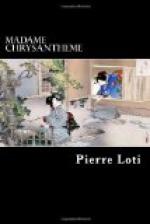There is nothing very precise as yet, but it is certain that one way or another, our stay in Japan is coming to an end. It is this perhaps which disposes me this evening, to throw a more friendly glance on my surroundings. It is about six o’clock, after a day spent on duty, when I reach Diou-djen-dji. The evening sun, low in the sky, on the point of setting, pours into my room, and floods it with rays of red gold, lighting up the Buddhas and the great sheaves of quaintly arranged flowers in the antique vases. Here are assembled five or six little dolls, my neighbors, amusing themselves by dancing to the sound of Chrysantheme’s guitar. And this evening I experience a real charm in feeling that this dwelling and the woman who leads the dance, are mine. On the whole I have perhaps been unjust to this country; it seems to me that my eyes are at last opened to see it in its true light, that all my senses are undergoing a strange and abrupt transition; I suddenly have a better perception and appreciation of all the infinity of dainty trifles amongst which I live; of the fragile and studied grace of their forms, the oddity of their drawings, the refined choice of their colors.
I stretch myself upon the white mats; Chrysantheme, always eagerly attentive, brings me my pillow of serpent’s skin; and the smiling mousmes, with the interrupted rhythm of a while ago still running in their heads, move round me with measured steps.
Their irreproachable socks with the separate great toes, make no noise; nothing is heard, as they glide by, but a froufrou of silken stuffs. I find them all pleasant to look upon; their dollish air has the gift of pleasing me now, and I fancy I have discovered what it is that gives it to them: it is not only their round inexpressive faces with eyebrows far removed from the eyelids, but the excessive amplitude of their dress. With those huge sleeves, it might be supposed they have neither back nor shoulders; their delicate figures are lost in these wide robes, which float around what might be little marionnettes without bodies at all, and which would slip to the ground of themselves were they not kept together midway, about where a waist should be, by the wide silken sashes,—a very different comprehension of the art of dressing to ours, which endeavors as much as possible to bring into relief the curves, real or false, of the figure.
And then, how much I admire the flowers arranged by Chrysantheme in our vases, with her Japanese taste: lotus flowers, great sacred flowers of a tender, veined rose-color, the milky rose-color seen on porcelain; they resemble, when in full bloom, great water-lilies, and when only in bud, might be taken for long pale tulips. Their soft but rather cloying scent is added to that other indefinable odor of mousmes, of yellow race, of Japan, which is always and everywhere in the air. The late flowers of September, at this season very rare and expensive, grow on longer stems than the summer blooms; Chrysantheme has left them their immense aquatic leaves of a melancholy seaweed-green, and mingled with them tall slight rushes. I look at them, and recall with some irony those great round bunches in the shape of cauliflowers, which our florists sell in France, wrapt in their white lace-paper.




